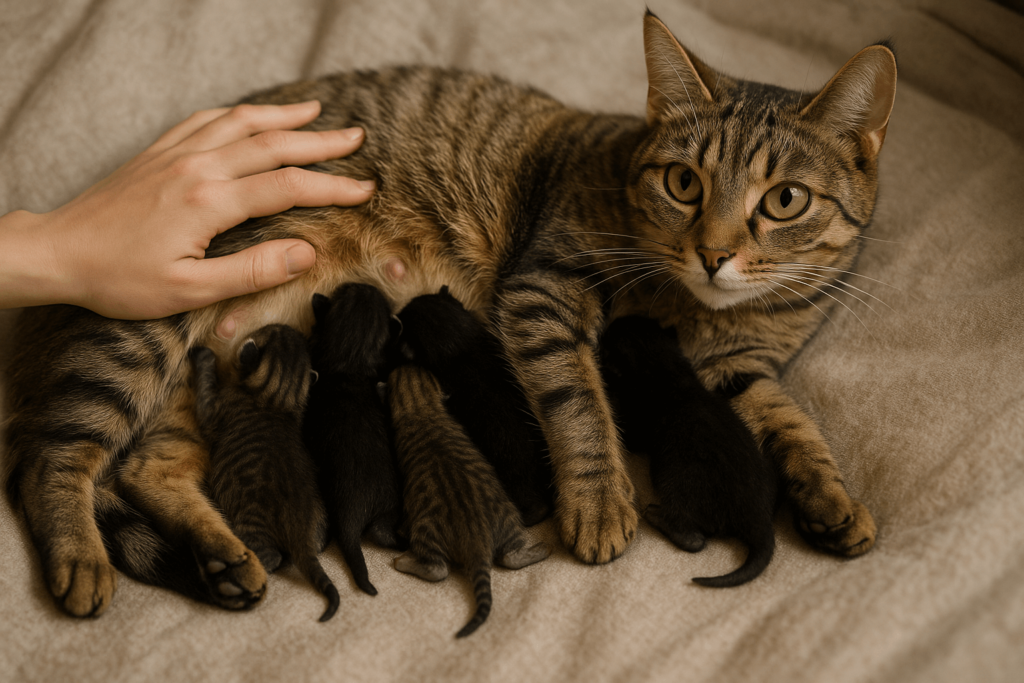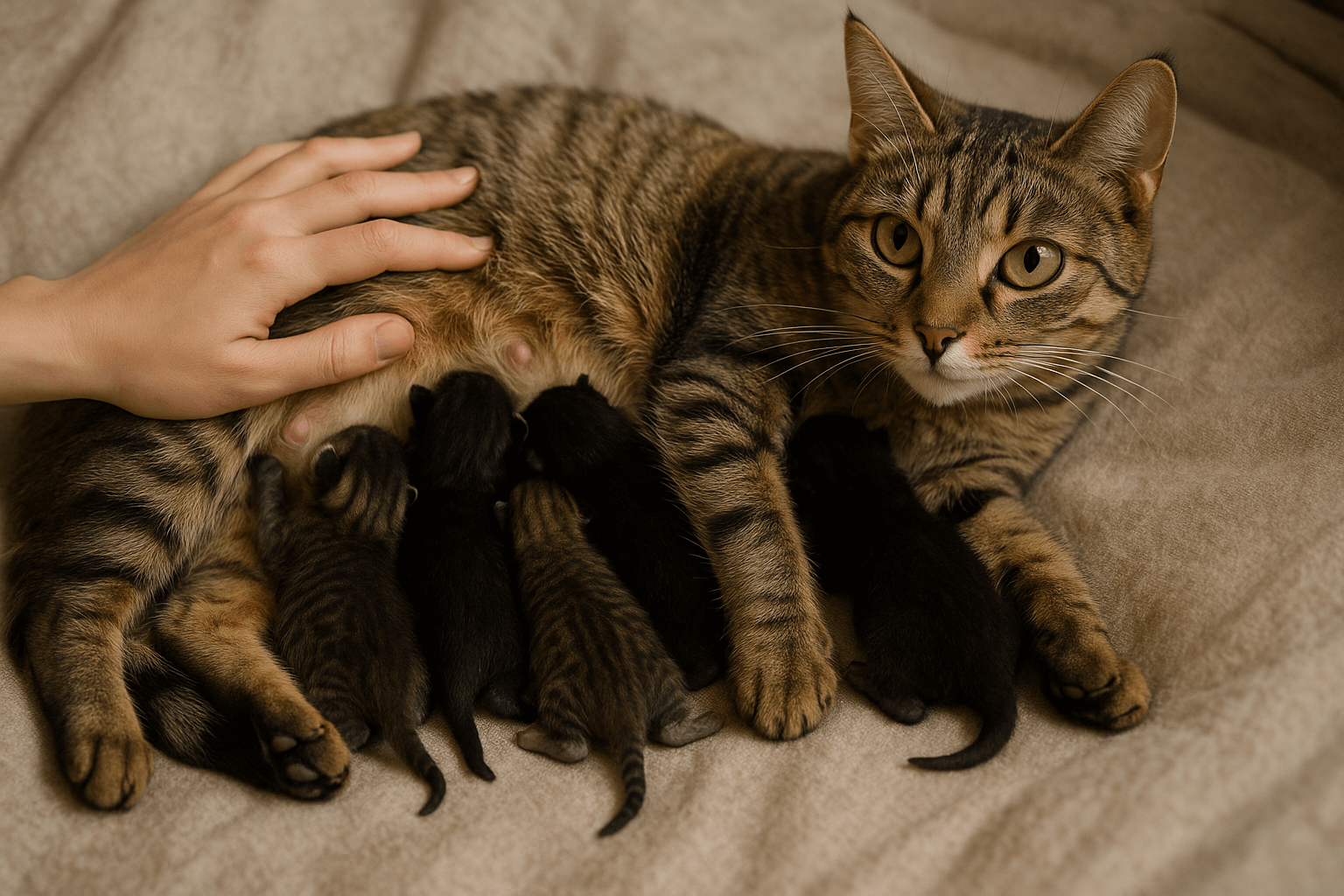What to Do After a Cat Gives Birth
Welcoming a litter of kittens into the world is an exciting yet delicate time for both you and your feline friend. While mother cats are naturally equipped to care for their newborns, there are important steps you can take to ensure a safe and healthy environment for the entire family. From monitoring the mother’s recovery to supporting her as she nurtures her kittens, your role is crucial in these early days. This guide will walk you through everything you need to know about what to do after a cat gives birth, helping you provide the best care possible for your cat and her precious litter.
Immediate Steps to Take After Birth
The moments following the birth are critical for ensuring the health and well-being of both the mother and her kittens. Here’s what you should focus on right away.
Provide a Quiet and Safe Space:
Ensure the birthing area remains calm and free from disturbances. Loud noises or frequent interruptions can stress the mother and disrupt bonding with her kittens.Check the Mother’s Health:
Observe the mother for signs of excessive bleeding, lethargy, or discomfort. These could indicate complications that require immediate veterinary attention.Remove Soiled Bedding:
Replace any soiled or bloody bedding with clean, soft materials to maintain hygiene and prevent infection.Count the Placentas:
Each kitten should have one placenta expelled during birth. If any are retained, it may lead to health issues for the mother.Monitor Newborn Kittens:
Ensure each kitten is breathing, nursing, and warm. Gently rub a kitten with a soft cloth if they appear weak or unresponsive.
Taking these immediate steps ensures a smooth transition for the mother and her kittens, setting the stage for a healthy recovery and nurturing period.

Caring for the Mother Cat Post-Birth
After giving birth, the mother cat needs special care to recover fully and stay strong enough to nurse her kittens. Here’s how you can support her during this critical time.
Offer Nutritious Food and Water:
Provide high-quality kitten food or wet food rich in protein and calories to replenish her energy reserves. Fresh water should always be available.Encourage Rest:
Allow the mother plenty of undisturbed rest. Avoid handling her excessively, as she needs time to bond with her kittens.Watch for Signs of Infection:
Check her mammary glands for swelling, redness, or discharge, which could indicate mastitis. Consult a vet if anything seems abnormal.Keep the Area Clean:
Regularly clean the birthing space to prevent bacteria buildup. Use pet-safe cleaning products to avoid harming the kittens.Limit Handling of Kittens Initially:
Minimize touching the kittens in the first few days to allow the mother to establish a strong bond and routine.
By focusing on the mother’s needs, you help her regain strength and confidence, enabling her to care for her kittens effectively.
Check this guide 👉Creating the Perfect Cat Birthing Box: Best 7 Health Tips!
Check this guide 👉How Long Do Cats Bleed After Giving Birth? Best 7 Tips!
Check this guide 👉Cat Gave Birth to One Kitten but Still Looks Pregnant: Best 7 Tips
Care Tips for the Mother Cat | Supporting Newborn Kittens |
|---|---|
Offer nutrient-rich food | Ensure all kittens are nursing properly |
Monitor for signs of infection | Keep kittens warm and dry |
Provide a quiet and stress-free zone | Stimulate urination/defecation if needed |
Maintain cleanliness around the nest | Weigh kittens daily to track growth |
Encourage rest and minimal disturbance | Handle kittens gently and sparingly |
How to Support the Kittens’ Development
Newborn kittens are entirely dependent on their mother for survival during the first weeks of life. Here’s how you can assist in their development while letting nature take its course.
Ensure Proper Feeding:
Kittens should nurse frequently from their mother. If the mother cannot feed them, consult a vet for guidance on bottle-feeding formula.Maintain Warmth:
Newborns cannot regulate their body temperature. Use a heating pad set on low or blankets to keep them warm, but avoid overheating.Stimulate Elimination:
The mother typically licks the kittens’ genital areas to stimulate urination and defecation. If she doesn’t, use a damp cotton ball to mimic this action.Weigh Kittens Daily:
Tracking weight gain helps ensure the kittens are thriving. A consistent increase in weight indicates healthy growth.Observe Behavior Closely:
Lethargic or overly vocal kittens may signal underlying problems. Contact a vet if you notice unusual behavior.
Supporting the kittens’ early development ensures they grow up healthy and strong under their mother’s care.
When to Seek Veterinary Help
While most births go smoothly, complications can arise that require professional intervention. Knowing when to seek help is vital for the safety of the mother and her kittens.
Prolonged Labor:
If the mother strains for more than 20-30 minutes without delivering a kitten, contact a vet immediately.Retained Placenta:
If you suspect a placenta hasn’t been expelled, seek veterinary assistance to prevent infection.Kitten Not Nursing:
A kitten that refuses to nurse or appears weak needs urgent care to survive.Mother Rejecting Kittens:
If the mother ignores or rejects her kittens, you’ll need to step in to hand-raise them until she resumes care.Signs of Illness:
Symptoms like vomiting, diarrhea, or fever in the mother or kittens warrant immediate medical attention.
Being vigilant about potential issues ensures timely intervention and better outcomes for the entire family.
Common Mistakes to Avoid
Caring for a mother cat and her kittens requires careful attention to detail. Avoiding common mistakes ensures a smoother experience for everyone involved.
Overhandling Kittens Too Soon:
Excessive handling can overwhelm the mother and disrupt bonding. Limit interactions until the kittens are older.Neglecting Hygiene:
Failing to keep the birthing area clean increases the risk of infections for both the mother and kittens.Assuming All Kittens Are Fine Without Checking:
Regularly monitor each kitten’s weight, behavior, and feeding habits to catch issues early.Forcing the Mother to Leave Her Nest:
Interrupting her time with the kittens can cause stress and hinder nursing.Using Unsafe Heating Methods:
Avoid direct heat sources like lamps, which can overheat or burn the kittens.
Avoiding these pitfalls promotes a safer and healthier environment for the entire family.
Preparing for Weaning
As the kittens grow, they’ll eventually transition from nursing to eating solid food. Preparing for weaning ensures a smooth shift for both the mother and her kittens.
Introduce Wet Food Gradually:
At around 4 weeks old, offer small amounts of wet kitten food mixed with water to encourage exploration.Supervise Initial Feedings:
Watch the kittens closely as they learn to eat independently to prevent choking or fighting over food.Reduce Nursing Time Gradually:
Slowly decrease the mother’s access to the kittens to give her body time to adjust to producing less milk.Clean Up Messes Promptly:
Kittens learning to eat solid food can make quite a mess. Clean spills quickly to maintain hygiene.Reintroduce Normal Feeding for the Mother:
Once weaning is complete, return the mother to her regular diet, ensuring she regains lost nutrients.
Preparing thoughtfully for weaning minimizes stress and supports the kittens’ independence.
Building a Bond with the Kittens
As the kittens grow older, building a bond with them strengthens your relationship and prepares them for eventual adoption or integration into your home.
Spend Time Near the Nest:
Sit quietly near the kittens to let them get used to your presence without feeling threatened.Engage in Gentle Play:
Around 3-4 weeks old, introduce soft toys to encourage playful interactions and build trust.Talk Softly to Them:
Speaking gently helps kittens associate your voice with comfort and safety.Handle Them Briefly Each Day:
Short, positive handling sessions teach kittens that human touch isn’t scary.Reward Calm Behavior:
Praise and reward kittens for calm, friendly behavior to reinforce good habits early on.
Building a bond fosters trust and sets the stage for happy, well-adjusted adult cats.
Frequently Asked Questions About Post-Birth Care for Cats
How long does it take for a mother cat to recover after giving birth?
Most mother cats recover within 1-2 weeks, but full physical recovery may take up to a month.
Should I separate the father cat from the mother and kittens?
Yes, keeping the male cat away prevents stress and potential harm to the kittens.
Can I touch the kittens right after birth?
It’s best to limit handling initially to allow the mother to bond with her litter.
What if the mother doesn’t produce milk?
Consult a vet for advice on feeding kitten formula and addressing lactation issues.
When do kittens start opening their eyes?
Kittens typically open their eyes between 7-10 days after birth.
Providing the Best Start for Mother and Kittens
The first weeks after a cat gives birth are filled with wonder and responsibility. By understanding the needs of both the mother and her kittens, you play a vital role in ensuring their health and happiness. From creating a safe environment to recognizing potential complications, your attentiveness makes all the difference. Remember, patience and care go a long way in helping this new family thrive. With your support, the mother cat can focus on nurturing her kittens, setting the foundation for their bright future together.
Canned Pumpkin for Cat Diarrhea: Best 7 Expert Tips! Natural remedy to firm stools, soothe upset bellies, and support gut health safely.
Can a Cat Give You Scabies? Best 7 Expert Tips! Discover the truth about feline mites, human skin risks, and how to protect yourself—without panic.
Cat Flea vs Human Flea: Best 7 Expert Tips! Discover the truth about bites, species, and how to eliminate infestations for good.
Weird Cat Behaviors: Best 7 Expert Tips! Discover why cats do strange things—and how to understand, not punish, their instincts for a happier home.





